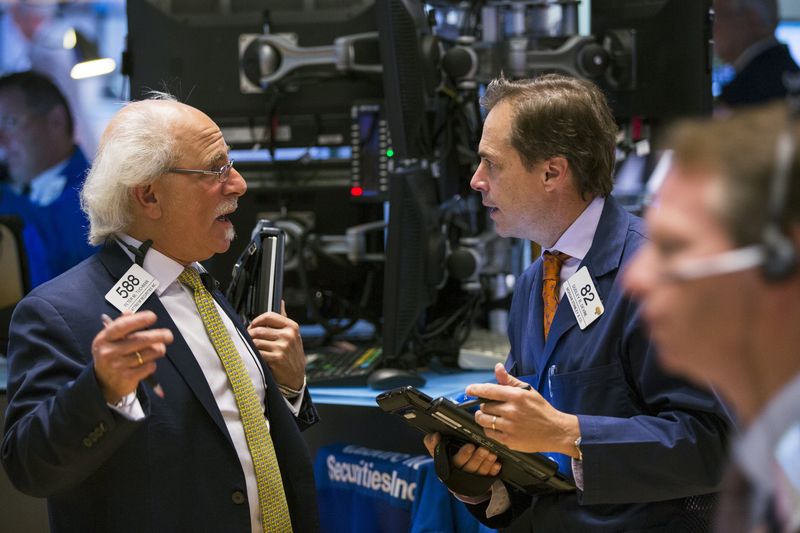Investing.com - Here are the top five things you need to know in financial markets on Tuesday, November 14:
1. Global Stocks Subdued in Cautious Trade
Global stock markets put in a subdued performance, as Chinese economic data disappointed and pessimism over the state of play on U.S. tax cuts helped drag markets down from record highs reached late last week.
Asian-Pacific markets ended mostly lower, but Japan's Nikkei managed to recoup early losses to end flat after four sessions of losses.
In Europe, the region's bourses hovered around the flatline in mid-morning trade, as investors focused on earnings.
On Wall Street, U.S. stocks pointed to a relatively weak open, as investors looked to key earnings reports to set the tone for the markets.
Results from the likes of retailers such as Home Depot (NYSE:HD), TJX (NYSE:TJX), Dick’s Sporting Goods (NYSE:DKS) and Advance Auto Parts (NYSE:AAP) are on the radar for Tuesday morning.
2. China's Economy Cools Further in October
Data released earlier showed that China's economy cooled further last month, with industrial output, fixed asset investment and retail sales all missing expectations as the government extended a crackdown on debt risks and factory pollution.
Industrial output rose 6.2% year-on-year in October, the National Bureau of Statistics (NBS) said, missing analysts' estimates of a 6.3% gain and lagging a 6.6% increase in September.
Fixed-asset investment growth also slowed to 7.3% in the January-October period, from 7.5% in the first nine months. Analysts had expected an increase of 7.4%.
Retail sales gained 10.0% in October on-year, versus an expected 10.4% rise and below the 10.3% growth in September.
Beijing is already in the second year of a campaign to reduce high levels of debt as authorities worry that riskier lending practices, especially in the real estate sector, could imperil the economy.
3. UK Inflation Holds at 5-Year High of 3%
British inflation held at its highest level in five-and-a-half years in October, and wrong-footed expectations from the Bank of England and other economists that it would hit a new peak.
Consumer price inflation held at an annual rate of 3.0% in October, the Office for National Statistics said, below expectations for a 3.1% annual rise. The ONS said October's steady reading reflected falls in fuel prices being offset by a higher cost of food.
Tuesday's figures are likely to reinforce doubts among economists about the wisdom of the BoE's decision to raise rates at a time when the economy is sluggish. The BoE said this month, after it raised interest rates for the first time in a decade, that inflation would probably peak at 3.2% in October and then fall slowly to just above its 2%- target in three years' time.
The pound fell to the day’s lows in reaction to the data, with GBP/USD sliding to 1.3076 from around 1.3116 earlier.
Meanwhile, the debate on the Brexit bill kicks off on Tuesday, and takes place against an unstable political backdrop. As many as 40 of Prime Minister Theresa May's lawmakers would support a no-confidence motion against her.
4. Euro Zone Economy Continues to Expand
The euro zone economy maintained its solid pace of expansion in the third quarter, keeping it on track for its best annual performance in a decade and supporting the European Central Bank's move to begin reducing its bond-buying program.
The European Union's statistics office Eurostat confirmed its estimate from Oct. 31 that the gross domestic product (GDP) of the 19 countries using the euro grew by 0.6% in July-September from the previous three months and was 2.5% higher than in the same period of 2016.
In Germany, expansion accelerated to 0.8% thanks to buoyant exports and investments, as it cemented its role as the region's growth engine.
A separate report showed that German economic sentiment improved less than forecast in November, but still hit the highest level in six months.
The euro climbed 0.5% against the dollar to reach a more than two-week high of 1.1723.
5. Focus Shifts to U.S. API Oil Supply Data
Investors looked ahead to weekly data from the U.S. on stockpiles of crude and refined products to gauge the strength of demand in the world’s largest energy consumer.
Industry group the American Petroleum Institute is due to release its weekly report at 4:30PM ET (2130GMT) Tuesday, amid forecasts for an oil-stock drop of around 2.8 million barrels.
U.S. crude futures were down about 20 cents, or around 0.4%, to $56.55 a barrel, while Brent shed 27 cents to $62.89.
Despite the cautious sentiment, crude prices stayed within sight of their strongest level in more than two years amid optimism that oil producing countries will agree to extend an output cut at their meeting at the end of this month.
